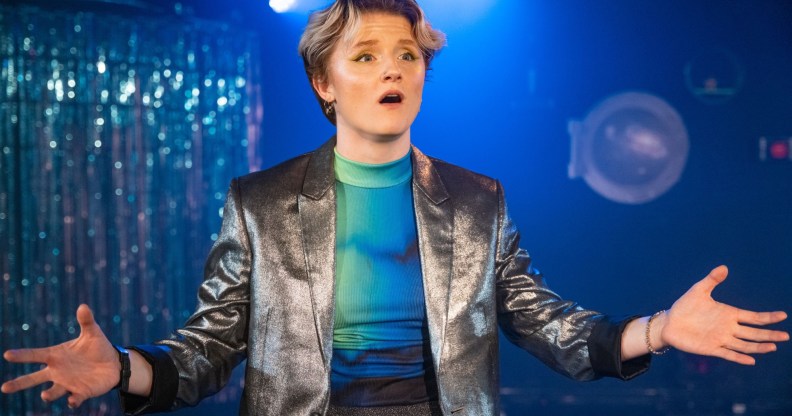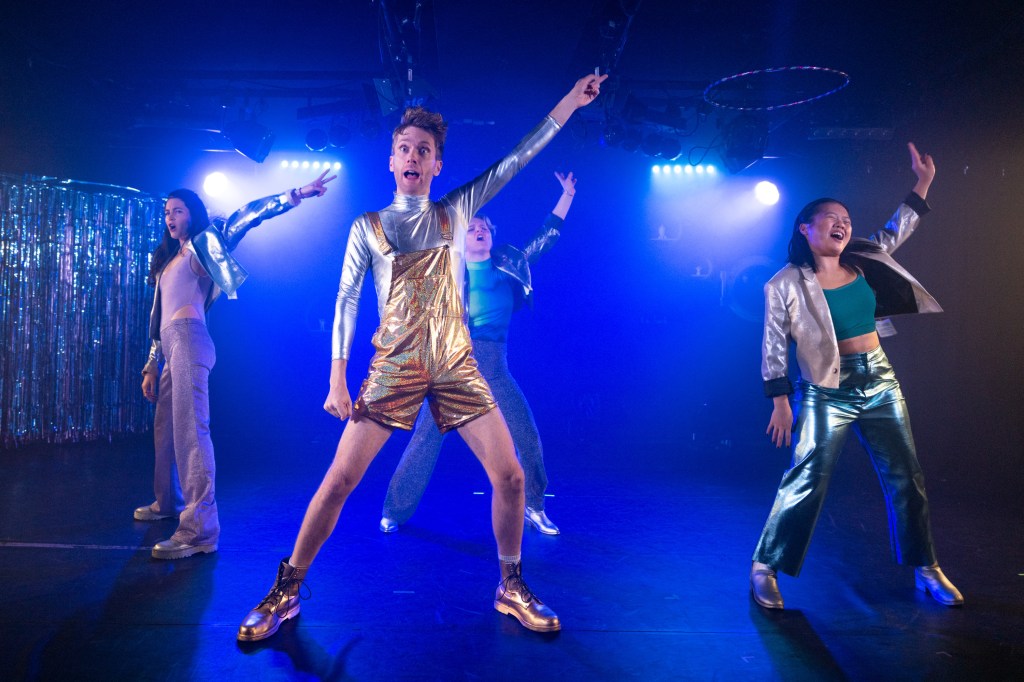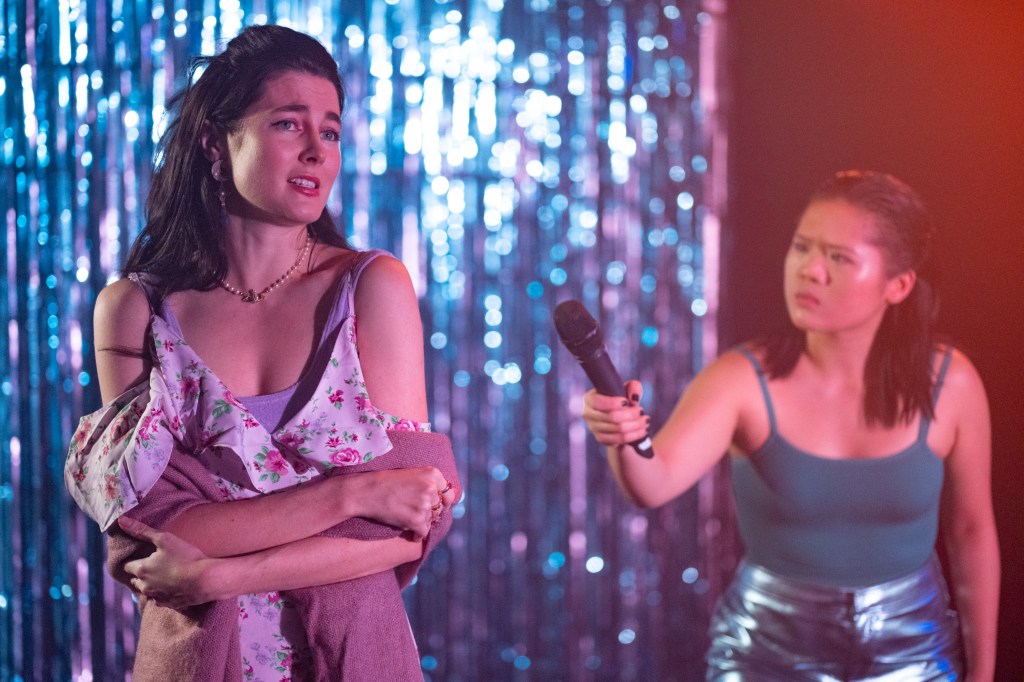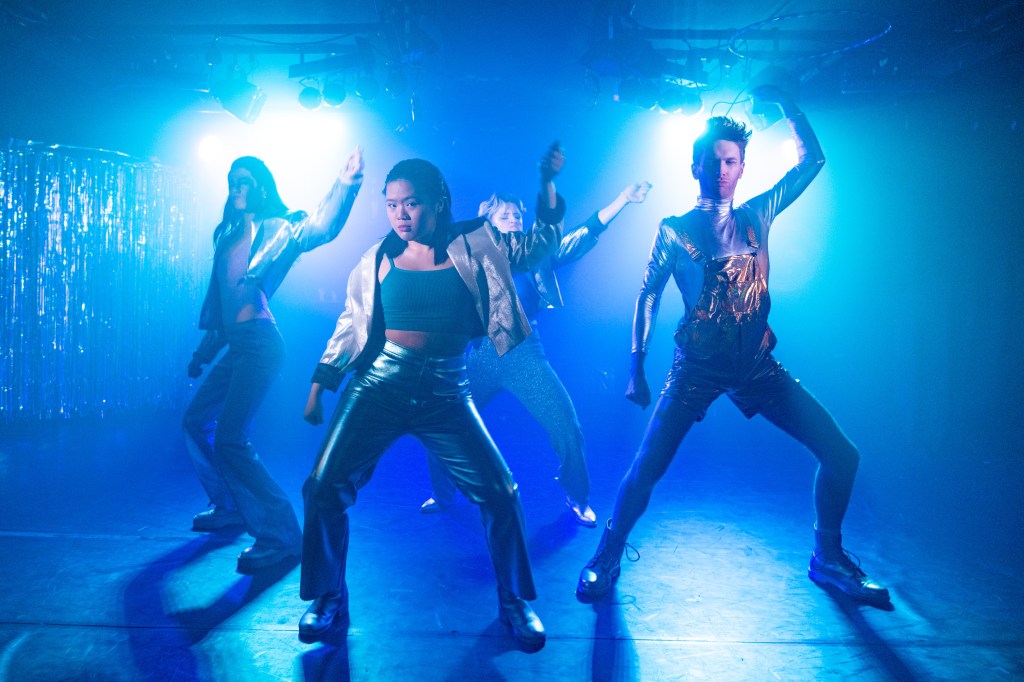The cosmos gets a queer makeover in Soho Theatre’s hilarious new comedy Lesbian Space Crime

Rosanna Suppa as Sue Albright in Lesbian Space Crime. (Cam Harle)
“In a vast cosmos where anything is possible…everything is gay.” These are the wise words of the creators behind Soho Theatre’s latest hit, Lesbian Space Crime.
The musical space odyssey stays true to its name, bringing lesbianism, campness and witty innuendo in this absolutely delightful satirical comedy.
Co-created by Eleanor Colville, Robbie Taylor Hunt and Rosanna Suppa, Lesbian Space Crime follows astronaut Sue Albright who is ready to make history in the first all-female space walk.
Little does Sue (Suppa) know, however, that her ex-wife Gaia (Colville) has a nefarious plan to accuse her of a crime that will see her career spinning out of cosmic control.
Despite the fantastical premise, the show actually takes inspiration from a real life scandal. “There was a headline years ago about an astronaut that got accused of a crime in space,” Suppa tells PinkNews, “and it outed her as a lesbian.”
“We immediately started texting ‘what an insane story’ and started fabricating a whole different narrative.”

At the heart of this tale, however, is the message that LGBTQ+ individuals shouldn’t have to be an ambassador for an entire community, and the very real consequences of being outed.
The show comes at a time when the pressure on public figures to come out is at an all-time high, with accusations of queerbaiting hitting the headlines on a near-daily basis.
“Kit Connor is an example of where that was really pushed to its extremes on a very public stage,” says Suppa of the forced outing of the Heartstopper star last month.
“This sense of owing an explanation of your identity had been so prevalent for years. Billie Eilish got it, Harry Styles is getting it.
“A lot of the show [Lesbian Space Crime] is batting away those expectations and looking inwards to yourself – asking, ‘is that identity a part that I want to put forward?”
The show also explores the dangers of putting LGBTQ+ people on a pedestal. “It’s political to just exist as a queer person in everyday interactions,” Suppa continues. “And feeling like you need to do it in the right way.”
The protagonist Sue Albright, who is in her late 40s, also adds to the much-needed representation of midlife and older LGBTQ+ characters.
“There’s a scene in Tales of the City where you have a bunch of older cis gay guys talking to a younger gay guy about their lived experience versus his,” Suppa explains. “I remember that stayed with me because you just so rarely get their experiences.”
Taylor Hunt agrees. “Growing up, I saw no examples of what my life could look like in 10 years, let alone 20, 30 or 40 years.
“You do rely on culture to show you these things. To show you a possible future otherwise it can feel quite destabilising not knowing what could be ahead of you.”
For Suppa, who identifies as non-binary, it was seeing a person at Pride who reminded them of a combination of Eddie Izzard and an older “trans masculine, butch looking person” that helped them realise “we can live long lives”.
Lesbian Space Crime isn’t afraid to tackle the absurdity of performative activism, the expectations of representation and queer relationships in high-pressure situations. But at its core, the creators emphasise the urgent need for unapologetically joyful LGBTQ+ stories.

“Basically we just had loads and loads of fun coming up with insane and wondrous ways that space could be queered in a massive way,” Suppa explains.
“We just got ambitious with it and came up with this completely fabricated story full of cosmic gay aliens and an evil ex-wife who’s ostensibly a pantomime villain.”
The show also brings much-needed levity when it comes to the way LGBTQ+ stories are portrayed in the arts.
“There’s a tendency for queer theatre to be hard and intense and brutal,” says Taylor Hunt. “And whilst we need that completely, I think it can be hard when queer people’s lives are hard.
“We have lots of joy and silliness and happiness and comedy in our lives too and it’s hard for someone who is coming to terms with their sexuality or gender identity to watch queer theatre and be like, ‘oh, it’s really bleak out there.'”
Suppa cites Black playwright Ryan Calais Cameron and “incredibly talented” disabled writer Amy Trigg as examples of those who have pushed the narrative forward when it comes to marginalised identities.
“Their [plays] have those darker shades but they paint with a full palette of colours. It is important to show the hardships, but you need those more uplifting beats.”

For Suppa, I, Joan sticks in the mind as a play that made her “fully cry”. Taylor Hunt, meanwhile, says he was deeply impacted by The P Word, which followed the plight of a gay Muslim asylum seeker.
“We’re at a point of getting more intersectional queer stories and nuanced queer stories, and people are excited and hungry for those stories as well,” he explains.
As Lesbian Space Crime prepares to take theatregoers to another dimension, Suppa hopes that the show will inspire people to stand in their authentic truth.
“You don’t owe society anything, you don’t owe the queer community anything. You can just do whatever feels right for you. That’s the whole point of queerness”.
Lesbian Spice Crime runs at Soho Theatre until 22 December. Tickets are available here.

